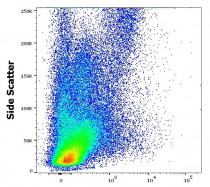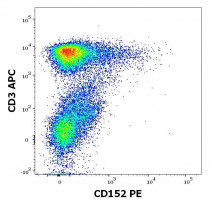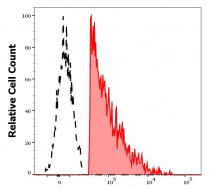ARG54228
anti-CD152 / CTLA4 antibody [BNI3] (PE)
anti-CD152 / CTLA4 antibody [BNI3] (PE) for Flow cytometry and Human
Developmental Biology antibody; Immune System antibody
Overview
| Product Description | PE-conjugated Mouse Monoclonal antibody [BNI3] recognizes CD152 / CTLA4 |
|---|---|
| Tested Reactivity | Hu |
| Tested Application | FACS |
| Specificity | The mouse monoclonal antibody BNI3 recognizes human CD152 / CTLA4, an approximately 45 kDa type I transmembrane protein serving as a negative regulator of T cell responses. |
| Host | Mouse |
| Clonality | Monoclonal |
| Clone | BNI3 |
| Isotype | IgG2a |
| Target Name | CD152 / CTLA4 |
| Antigen Species | Human |
| Immunogen | Human CD152-IgG heavy chain fusion protein |
| Conjugation | PE |
| Alternate Names | GRD4; CTLA-4; CELIAC3; CD; Cytotoxic T-lymphocyte-associated antigen 4; CD152; GSE; CD antigen CD152; Cytotoxic T-lymphocyte protein 4; ALPS5; IDDM12 |
Application Instructions
| Application Suggestion |
|
||||
|---|---|---|---|---|---|
| Application Note | * The dilutions indicate recommended starting dilutions and the optimal dilutions or concentrations should be determined by the scientist. |
Properties
| Form | Liquid |
|---|---|
| Purification Note | The purified antibody is conjugated with R-Phycoerythrin (PE) under optimum conditions. The conjugate is purified by size-exclusion chromatography and adjusted for direct use. No reconstitution is necessary. |
| Buffer | PBS, 15 mM Sodium azide and 0.2% (w/v) high-grade protease free BSA |
| Preservative | 15 mM Sodium azide |
| Stabilizer | 0.2% (w/v) high-grade protease free BSA |
| Storage Instruction | Aliquot and store in the dark at 2-8°C. Keep protected from prolonged exposure to light. Avoid repeated freeze/thaw cycles. Suggest spin the vial prior to opening. The antibody solution should be gently mixed before use. |
| Note | For laboratory research only, not for drug, diagnostic or other use. |
Bioinformation
| Database Links | |
|---|---|
| Gene Symbol | CTLA4 |
| Gene Full Name | cytotoxic T-lymphocyte-associated protein 4 |
| Background | CD152 / CTLA-4 is a homodimeric transmembrane protein similar to CD28 and binding the same ligands, i.e. CD80 (B7.1) and CD86 (B7.2), but with higher affinity. Unlike CD28 with important costimulating functions, CD152 acts as an important inhibitory receptor essential for modulation of the immune system. CD152 / CTLA-4 becomes transiently expressed on activated T cells and its malfunction can cause autoimmune diseases, such as insulin-dependent diabetes mellitus, Graves disease, Hashimoto thyroiditis, celiac disease, systemic lupus erythematosus, or thyroid-associated orbitopathy. |
| Function | Inhibitory receptor acting as a major negative regulator of T-cell responses. The affinity of CTLA4 for its natural B7 family ligands, CD80 and CD86, is considerably stronger than the affinity of their cognate stimulatory coreceptor CD28. [UniProt] |
| Research Area | Developmental Biology antibody; Immune System antibody |
| Calculated MW | 25 kDa |
| PTM | N-glycosylation is important for dimerization. Phosphorylation at Tyr-201 prevents binding to the AP-2 adapter complex, blocks endocytosis, and leads to retention of CTLA4 on the cell surface. |
Images (3) Click the Picture to Zoom In
-
ARG54228 anti-CD152 / CTLA4 antibody [BNI3] (PE) FACS image
Flow Cytometry: PHA stimulated human peripheral whole blood stained with ARG54228 anti-CD152 / CTLA4 antibody [BNI3] (PE) (10 µl reagent / 100 µl of peripheral whole blood).
-
ARG54228 anti-CD152 / CTLA4 antibody [BNI3] (PE) FACS image
Flow Cytometry: PHA stimulated human lymphocytes stained with ARG54228 anti-CD152 / CTLA4 antibody [BNI3] (PE) (10 µl reagent / 100 µl of peripheral whole blood) and ARG54302 anti-CD3 antibody [UCHT1] (APC) (10 µl reagent / 100 µl of peripheral whole blood).
-
ARG54228 anti-CD152 / CTLA4 antibody [BNI3] (PE) FACS image
Flow Cytometry: Separation of human CD152 positive CD3 positive lymphocytes (red-filled) from CD152 negative CD3 negative lymphocytes (black-dashed). Human PHA stimulated peripheral whole blood stained with ARG54228 anti-CD152 / CTLA4 antibody [BNI3] (PE) (10 µl reagent / 100 µl of peripheral whole blood).










